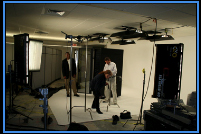Tips for Production Assistants
 Breaking into the world of production can be tricky but one of the best ways is to start as a PA (production assistant). Historically, the smaller the crew the more responsibility you’ll have but that’s not always the case. You can find yourself on high budget film shoots or small corporate videos. No matter what the gig, here are some tips on what it takes to be a great PA.
Breaking into the world of production can be tricky but one of the best ways is to start as a PA (production assistant). Historically, the smaller the crew the more responsibility you’ll have but that’s not always the case. You can find yourself on high budget film shoots or small corporate videos. No matter what the gig, here are some tips on what it takes to be a great PA.
Listen:
Probably the number one skill of any crew member is the ability to listen. Seems simple but if a producer only has to say things once, it makes their job much easier. If you have a lousy memory, have a note pad and write everything down.
Watch:
Try to be aware of what’s going on around you. If you see someone struggling with something, ask if they need help. Never help without asking first and give people their space. Shoots can be stressful for a number of reasons (big name talent, client breathing down the producer’s neck, cranky crews, etc.). If you’re given a specific role, stick to it but if you’re there for general assistance, offer help wherever you see a need. Lastly, don’t forget to watch out! There is stuff everywhere on shoots from lighting stands to extremely expensive camera equipment.
Coffee:
The most important part of any shoot is not lighting, sound or video, it’s COFFEE! It’s the one drug just about every crew member is addicted to. If you get a call for a job, Google the location to see where the nearest coffee shops are. There are Dunkin people and there are Starbucks people, learn the nearest locations you’ll be a hero for life! Go one step beyond and get the phone numbers so you can call in orders just before getting there. If the shoot has multiple locations, learn the task for each place.
Home Depot and CVS:
At some point, you’ll probably have to do some kind or run to a store. That place will most likely be a hardware store or generic supply store. You will totally blow the producer away if you tell them you know exactly where local places are in case anything is needed.
What to carry:
Get a good backpack and carry any and all of the following items: Sharpie markers, water, hat, pens and pencils, scissors, pocket knife, white tape, a cheap waterproof rain poncho (or good rain gear), charged up cell phone (and charger), still camera, sun screen, bug spray, sun glasses, sweater/sweatshirt, sanitized hand wipes, band-aids, Aspirin, energy bars, gum/mints, lint roller, Shout stain wipes (not sure what they’re actually called), Chapstick, business cards or just cards with contact details. You never know what job you’ll have to do and where you’ll be doing it which is why the rain gear and sweater. Also, chances are at some point in the shoot, someone is going to need one of those other items you’re carrying and you’ll be ready to be the hero.
What to wear:
Comfortable shoes and dress are a must. You could be standing for a long time on big film shoots or walking back and forth across giant fields or beaches. A typical film shoot has 18 hour days and you need to be as comfortable as possible.
When to speak up and when not to:
This is tricky. You want to be helpful but not over-bearing. If you truly listen and watch what is going on and use basic common sense, you’ll know when to offer up suggestions. Opinions on the creative process should be kept to yourself unless someone asks you for it. When someone does call you for a PA job, be sure to tell them if you have a usable skill such as construction, sewing, accounting, typing, painting, photography since it might get you on the next big gig. While on the subject of speaking, if you don’t know how to do something, just ask. Even if it looks painfully easy, people will appreciate that you asked and not just assumed how something worked.
Just say NO!
This last tip is one we feel really strongly about. If someone asks you to do something you’re not comfortable with then DON’T DO IT! You have every right to say no to a producer and never fear the wrath of the statement “You’ll never work in this town again.” Things like “drive as fast as you can to get there” or “stand on the roof of that house” are not part of the deal. Be honest and tell them about your fears concerns and they will most likely understand. If they refuse to listen, just walk away. Your personal safety is never worth “the shot.”



